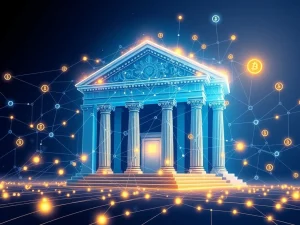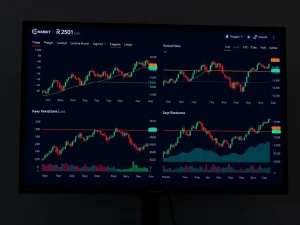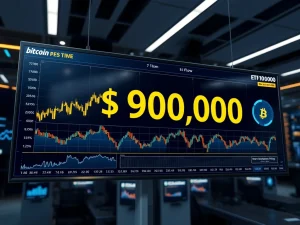Triumphant Release: Ethereum Researcher Virgil Griffith Freed After North Korea Sanctions Case

In a story that has gripped the cryptocurrency world for years, Ethereum researcher Virgil Griffith has been released from prison. After a long and arduous legal battle stemming from a lecture he gave in North Korea, Griffith is now beginning the next chapter of his life. For those in the crypto space, Griffith’s case has become a symbol of the ongoing tension between technological innovation and governmental control. Let’s delve into the details of this landmark event and what it means for the future of crypto.
The Moment of Freedom: Virgil Griffith’s Prison Release
On April 9th, the Bureau of Prisons confirmed the news that many in the crypto community had been eagerly awaiting: Ethereum researcher Virgil Griffith was released from prison custody. Brantly Millegan, a well-known figure in the crypto development world, shared images of Griffith with his parents immediately after his release, marking a poignant end to a long ordeal. While Griffith is now in a halfway house as part of his parole process, this release is a significant milestone. It signifies the beginning of his reintegration into society after serving time for a controversial case that sparked widespread debate about freedom of information and the boundaries of sanctions.
Key Takeaways from Virgil Griffith’s Release:
- Release Date: April 9th, according to the Bureau of Prisons.
- Halfway House: Griffith will spend several weeks in a halfway house as part of parole.
- Background: Arrested in 2019 for lecturing in North Korea about blockchain technology.
Why Was This Ethereum Researcher Imprisoned? The North Korea Lecture Explained
The saga began in 2019 when Virgil Griffith traveled to Pyongyang to deliver a lecture titled “Blockchains for Peace in North Korea.” The lecture itself focused on the potential of blockchain technology and its capacity to bypass sanctions. While the information shared was largely publicly available on the internet, the US government took a strong stance, arguing that Griffith violated the International Emergency Economic Powers Act (IEEPA). They claimed he provided “highly technical information” to North Korea, a nation under strict US sanctions. This arrest sent shockwaves through the tech and crypto communities, raising questions about the extent to which knowledge sharing can be regulated, particularly in the decentralized and borderless world of blockchain.
The Core of the Controversy:
- Lecture Topic: “Blockchains for Peace in North Korea”
- Location: Pyongyang, North Korea
- US Government Charge: Violation of the International Emergency Economic Powers Act (IEEPA)
- Accusation: Providing technical information that could help North Korea evade sanctions.
- Defense Argument: Information was already public knowledge.
The Legal Labyrinth: Griffith’s Battle Against US Prosecutors
In January 2020, a grand jury indicted Ethereum researcher Virgil Griffith for conspiracy to violate the IEEPA. The IEEPA is a powerful law that empowers the Executive Branch to restrict economic interactions between US citizens and nations deemed adversarial. Griffith initially pleaded not guilty, and his legal team mounted a robust defense, arguing that he had merely presented publicly available information, not violating any laws. They filed a motion to dismiss the case in October 2020, but the legal process dragged on for nearly two years. Eventually, in September 2021, facing mounting legal pressure, Griffith accepted a plea deal, pleading guilty to violating sanctions laws. He was sentenced to 63 months in prison and a hefty $100,000 fine in April 2022.
However, the story didn’t end there. In April 2024, Griffith’s legal team filed a motion to reduce his sentence. Despite opposition from prosecutors who argued his actions harmed national security, Judge Kevin Castel granted a sentence reduction in July 2024, bringing it down to 56 months. This reduction paved the way for his eventual prison release this month.
Timeline of Virgil Griffith’s Legal Journey:
| Date | Event |
|---|---|
| 2019 | Arrested for North Korea lecture |
| January 2020 | Indicted by US Grand Jury |
| October 2020 | Motion to dismiss case filed |
| September 2021 | Pleads guilty as part of plea deal |
| April 2022 | Sentenced to 63 months in prison, $100,000 fine |
| April 2024 | Motion to reduce sentence filed |
| July 2024 | Sentence reduced to 56 months |
| April 2024 | Prison Release |
The Broader Implications: Crypto, Censorship, and State Power
Virgil Griffith’s case goes far beyond just one individual. It highlights a crucial tension in the crypto world: the clash between the decentralized, permissionless nature of blockchain technology and the regulatory powers of nation-states. Blockchain, by its very design, aims to circumvent traditional financial controls, censorship, and surveillance. This inherent characteristic can be seen as both a benefit and a threat, depending on one’s perspective. For individuals seeking financial freedom and privacy, it’s empowering. For governments concerned with national security and economic control, it can be perceived as a challenge to their authority.
Griffith’s prosecution underscores the US government’s willingness to use its legal powers to control the flow of information, even publicly available information, when it comes to nations deemed adversaries. This case raises important questions for crypto developers and the broader tech community:
- Freedom of Information: To what extent can governments regulate the sharing of publicly available knowledge, especially in the digital age?
- Decentralization vs. Regulation: How can the crypto space navigate the inherent tension between decentralization and increasing regulatory scrutiny?
- Global Reach of Sanctions: How far-reaching are US sanctions, and what are the implications for global technology and information sharing?
- Developer Responsibility: What are the ethical and legal responsibilities of developers creating technologies that can be used to circumvent state controls?
What’s Next for Virgil Griffith and the Crypto World?
With Virgil Griffith now released, the crypto community watches with bated breath to see what his next steps will be. His case has undoubtedly left a lasting mark, serving as a cautionary tale and a rallying cry for those advocating for greater freedom in the crypto space. It’s a stark reminder of the power of governments to intervene in the seemingly borderless world of digital technology. As the crypto landscape continues to evolve and mature, the issues raised by Griffith’s case – censorship, regulation, and the balance between innovation and national security – will remain central to the ongoing conversation.
The release of Ethereum researcher Virgil Griffith is not just the end of a personal ordeal, but also a pivotal moment that forces the crypto industry to confront the complex relationship between technology, freedom, and state power. The debates sparked by his case are far from over and will continue to shape the future of cryptocurrency and its place in the world.










